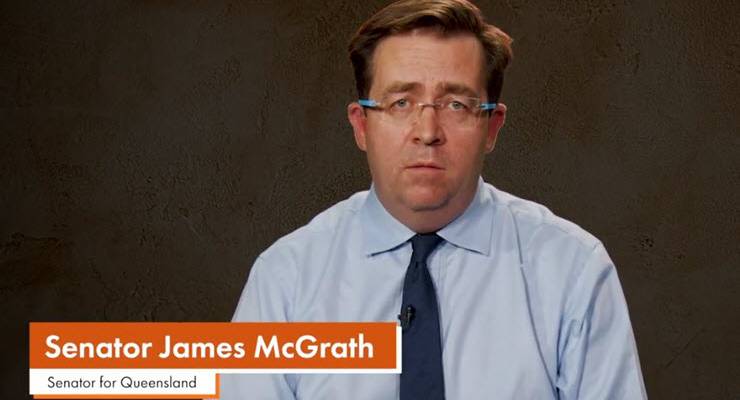
Yesterday, the far-right Institute of Public Affairs launched a YouTube video as part of its “Race Has No Place” campaign against the Voice to Parliament. The Voice was a core recommendation from the 2017 Uluru Statement from the Heart, which would allow Indigenous Australians to provide feedback on legislation that affects them.
The IPA’s claims against the Voice range from valid to nonsensical. Let’s take a look:
The claim: details aren’t decided
“One of the problems with [a voice] is just what do we mean by represent and how would they represent that?” — Dr Anthony Dillon
Valid. The video opens by questioning how a voice would operate. It’s a point deliberately left open by the Referendum Council. It’s also why Minister for Indigenous Australians Ken Wyatt this week asked professors Marcia Langton and Tom Calma to co-lead a new design process.
The claim: there is disagreement
“There’s diversity in the Indigenous population just as there is in the non-Indigenous population.” — Dr Anthony Dillon
Valid. The Uluru Statement from the Heart was proposed by the 16-member Referendum Council, endorsed by 250 Aboriginal and Torres Strait Islander leaders, and created in consultation with 1200 other Indigenous representatives over the span of six months.
But while it was recognised as a deeply representative call to action, there are of course Indigenous critics, extending beyond both Jacinta Nampijinpa Price and Anthony Dillon (featured in the video). Some delegates walked out of talks with the Referendum Council over objections to constitutional recognition.
The claim: Australia doesn’t support this
“We should look at proposals that unite Australians not the proposals that divide Australians.” — James McGrath
Eh. Good news, James: early survey suggest over 60% community support for the voice!
The claim: there are other problems to solve
“A Voice to Parliament will not fix youth suicide in Indigenous communities, it will not fix the infant mortality rate, it will not fix unemployment.” — James McGrath
Misleading. McGrath, who dismisses inequality before later acknowledging it, is arguing against progress on Indigenous self-determination on the basis it might not fix everything.
The claim: this is political segregation
“I don’t want Indigenous Queenslanders being separated from non-Indigenous Queenslanders on the basis of their race and who they can vote for and where they can vote on the basis of a special chamber or a special voice. — James McGrath
“[It’s] patronising … it’s a form of political segregation.” — Lorraine Finlay
Misleading. There is no suggestion that a voice would affect voting rights. The “special chamber” furphy has been debunked to the point where even Barnaby Joyce has unreservedly apologised for furthering it.








Having lived and worked in a small town with a substantial Indigenous population, there is already significant differences in how they are treated and more importantly how they feel. They all, even the clearly “successful” in white terms , live with a degree of fear of white authority and the imposition of more controls eg the cashless welfare card-almostly exclusively applied to them, being imposed on their already cicumscribed lives.
Why did Morrison choose to be seen at a cricket and a net-ball match rather than at the closure of Uluru to climbing?
Because he didn’t want to be seen giving ground by this element?
Meanwhile Ken Wyatt toes the Morrison party line …….
“Over 250 Aboriginal and Torres Strait Islander delegates gather at Uluru to craft the Uluru Statement from the Heart, which is an historic consensus position on Indigenous constitutional recognition.”
This is the largest Indigenous community consensus since the 1967 referendum. Yet the IPA and all conservatives claim it to be unrepresentative. ……. since, what, 3% walked away from it!
The 16 person Referendum Council was chosen by a Conservative Govt, travelled Oz and consulted widely over 12 months. No mention of who they were in this article, but it would add to appreciating the credibility of their work.
Now, their recommendations are misreprented and attacked by those who have never actively worked for any indigenous progress. It is not in the Conservatives DNA.
Turnbull’s kneejerk labelling of their work as seeking a third chamber should have been widely discredited by now, and should have dominated media treatment of this issue. But No, of course not, so the IPA, Senator McGrath and their ilk can continue to froth and blather on.
Crushing minorities is an ageless international phenomenom. Equally ageless is the need for some people like James McGrath and members of the IPA to make absolutely certain that the minorities, in our case the aboriginal people, stay crushed. Every now and then there is a successful “break-out” such as “The Apology” done so well by Kevin Rudd that it captured world attention. Sadly, I do not see such a champion on the horizon on this occasion – Ken Wyatt even looks crushed!
Morrison continues the deception he has indulged in since becoming Party Leader. He is very conservative on everything but he wants us to all think that he is this very nice, slightly overweight dad who likes a meat pie, a schooner of beer, American baseball caps and every sport played in Australia (even if he does not understand the rules). He is never seen at occasions where he may face awkward questions and if he is occasionally caught out he bats these questions away or lies. He has sent Ken Wyatt out to utilise his decent image to sell the Party’s real position. This tactic is being repeated week in and week out and he is not being called out. Anyway quiet Australians do not call out PMs as that is rude.